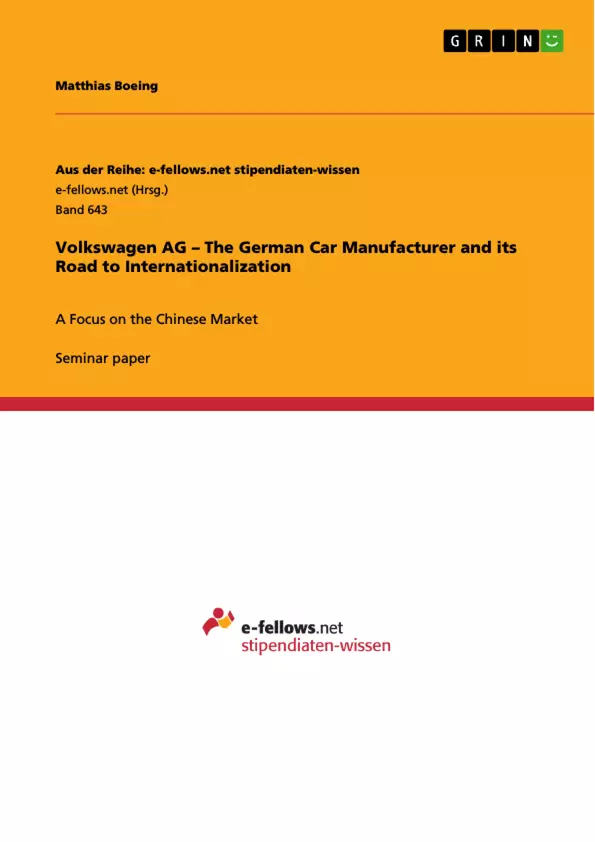During the last decades the rapidly increasing pace of globalization created opportunities as well as challenges for many corporations all over the world. Among other industries, this process has also heavily affected car manufactures.
From a first idea about a “Volkswagen” in 1904, the Volkswagen Group has grown to one of the largest and most successful car manufacturers worldwide ranked 17th among the world’s biggest corporations by Forbes. Fuelled by the economic rebuilding of Europe as well as the attempts of several third world countries to gain economic influence, Volkswagen started its road to internationalization around 1950 to 1960 resulting in a breakthrough in Europe, the United States as well as Africa. Continuing this process Volkswagen later discovered the Chinese market in the 1980s. On the one hand this internationalization was favoured by opportunities but on the other hand different countries come along with issues that are unlike of those in their home market in Germany. This essay investigates which main opportunities and challenges VW particularly faced in the Chinese market starting from the beginning of its operations in 1985 to the early 21st century using an institution - based view. It also critically analyses the applicability of Dunning’s OLI paradigm for Volkswagen’s internationalization strategy in China.
Inhaltsverzeichnis (Table of Contents)
- 1. Introduction
- 2. VW's Internationalization Strategy and China
- 3. Volkswagen in China – An Institution-Based View
- 3.1. Opportunities for Volkswagen in China
- 3.2. Challenges for Volkswagen in China
- 4. The OLI Paradigm and its Applicability for VW in China
- 5. Conclusion
Zielsetzung und Themenschwerpunkte (Objectives and Key Themes)
This essay examines the opportunities and challenges Volkswagen faced in the Chinese market from the beginning of its operations in 1985 to the early 21st century. It analyzes the company's internationalization strategy in China, specifically focusing on the applicability of Dunning's OLI paradigm. The essay utilizes an institution-based view to explore the influence of both formal and informal institutions on Volkswagen's experience in China.
- Volkswagen's internationalization strategy and its evolution
- Opportunities and challenges in the Chinese market
- The role of formal and informal institutions in China
- The applicability of Dunning's OLI paradigm to VW's strategy in China
- The impact of China's economic transition on Volkswagen's operations
Zusammenfassung der Kapitel (Chapter Summaries)
Chapter 1: Introduction
This chapter introduces the context of Volkswagen's internationalization, highlighting the growing pace of globalization and its impact on the automotive industry. It traces the company's history from its origins to its expansion into international markets, emphasizing its early successes in Europe, the United States, and Africa. The chapter focuses on the challenges Volkswagen faced in entering new markets, particularly in China, and how these challenges differ from its experiences in its home market of Germany.
Chapter 2: VW's Internationalization Strategy and China
This chapter provides an overview of Volkswagen's internationalization strategy, classifying it as distribution-oriented in its early stages and progressively evolving towards a production-oriented multinational corporation. It traces the company's internationalization process through three phases, emphasizing the role of exports and the establishment of production facilities worldwide. The chapter highlights the importance of VW's market entry in China through joint ventures, marking a significant step towards a transnational corporation.
Chapter 3: Volkswagen in China – An Institution-Based View
This chapter delves into an institution-based view of Volkswagen's experience in China. It explores the concepts of formal and informal institutions, emphasizing their role in creating order and reducing uncertainty. The chapter discusses the development of China's institutional framework, highlighting its initial lack of formal institutions, particularly in areas like legal protection and intellectual property rights. It argues that informal institutions, such as culture and personal relationships, gained greater significance in China's business environment.
Chapter 3.1: Opportunities for Volkswagen in China
This chapter focuses on the opportunities Volkswagen encountered in the Chinese market. It explores the impact of China's economic transition from a planned economy to a market economy, highlighting the Open Door Policy and its implications for attracting foreign direct investment. The chapter emphasizes the increasing demand for high-quality transportation, fueled by China's growing middle class and rising living standards. It also highlights the benefits of joint ventures in enabling Volkswagen to access a market with significant potential.
Schlüsselwörter (Keywords)
This essay focuses on the key concepts of internationalization, globalization, institution-based view, formal and informal institutions, opportunities and challenges, OLI paradigm, and the Chinese market. It examines Volkswagen's internationalization strategy, the role of institutions in China, and the applicability of Dunning's OLI paradigm to the company's operations in China.
- Quote paper
- Matthias Boeing (Author), 2013, Volkswagen AG – The German Car Manufacturer and its Road to Internationalization, Munich, GRIN Verlag, https://www.grin.com/document/209701



